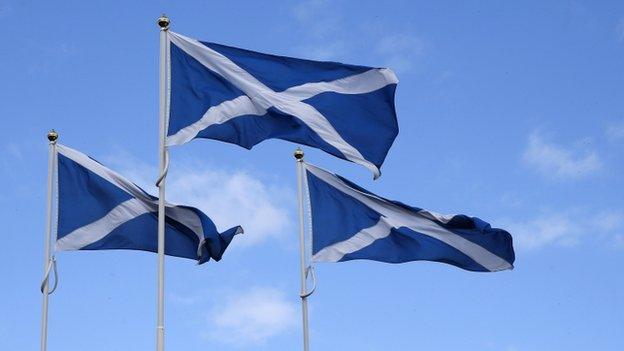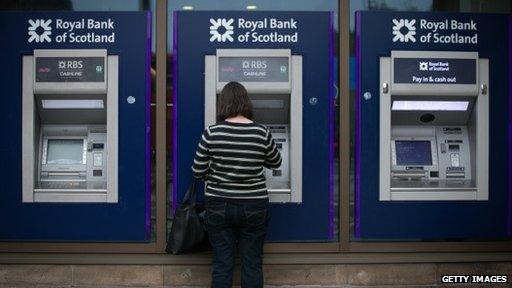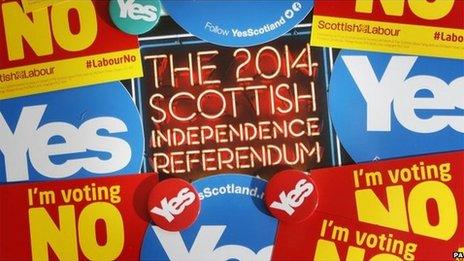How Scotland can avoid a credit crunch
- Published
- comments

So is Deutsche Bank right that Scotland seceding would have a depressive impact comparable to Britain returning to the Gold Standard in 1925 or the US Federal Reserve failing to pump cash into US banks on the eve of the Great Depression?
No, according to senior bankers - whose institutions will have a decisive influence on the immediate economic and financial costs of Scottish separation.
That said, to avoid the worst a number of related important announcements would have to be made by the Treasury, the Bank of England, big banks and Alex Salmond at 7am on Friday morning.
Strikingly, what Salmond says is probably more important than anything else.
I will come back to what those interrelated official statements would be in a moment.
But it is also important to get the scale of the problem into perspective.
The big risk, as you cannot fail to have clocked by now, is that in the early hours of Friday morning, a decision will have been taken by the Scots to form a new independent nation, but no decision will have been taken on what the currency of that new nation would be.
So the fear would be that Scotland would adopt a new currency whose value would fall, relative to sterling.
Now the biggest anxiety stemming from this foreign exchange risk is that banks lending in Scotland could incur big losses, because they would be receiving repayment of loans in a soft and falling new Scottish currency, and the amount they would receive in repayments would not match what they owe depositors and other creditors in solid and rising sterling.
But it is vital to note that this is only a big problem for banks if they have lent more in Scotland than they have raised in Scotland in the form of deposits - because both the loans and the deposits would be converted into the new currency.
If their Scottish loans are no greater in value than their Scottish deposits, then loan repayments would continue to cover what they owe depositors, and there would be no risk of loss for the bank.
So are Scottish bank loans fully funded by Scottish deposits?
Well, my understanding is that is true of RBS and TSB.
For Lloyds there is a £3bn gap. But I am told Lloyds does not regard that gap as a serious problem: in the 18 months between a vote and Scotland formally becoming independent, Lloyds believes it could raise a bit more in Scottish deposits by putting up interest rates or it could persuade a few businesses to convert their Scottish loans into English loans.
Lloyds does not believe it would have to seriously curtail lending in Scotland to close this £3bn funding gap.
In fact, none of the banks believe that a vote for Scottish independence would inevitably lead to a serious credit crunch in Scotland, a freeze on the provision of new loans, so long as a number of important things happen in the immediate aftermath of a vote for independence.

All of those things would be designed to ward off a massive flight of cash out of bank branches in Scotland and in to bank branches in England.
They would be initiatives whose point would be to prevent a big gap emerging between what banks lend in Scotland and what they borrow in Scotland.
Because, to labour this important point, if such a huge gap did start to yawn, then banks would have no choice but to scale back lending in Scotland in a serious and economically harmful way.
So what has to take place at dawn on Friday morning, to prevent massive capital flight from Scotland and avert economically devastating financial instability?
By the way, before I get into this, it is important to remember that the economies of England, Wales and Northern Ireland are intimately and inextricably connected to that of Scotland. So a serious economic contraction there would have a nasty impact on the whole of what we currently call the United Kingdom.
So it is in the interests of the Treasury and Bank of England to prevent the worst happening north of the border.
Well, we already know part of what will, and needs to be announced, to avert meltdown.
All the big banks with Scottish homes - RBS, Lloyds, TSB, Tesco Bank and Clydesdale - would announce their registered offices would be moved to London, so that they would continue to be under the protection and regulation of the Bank of England.
And, to be clear, for all the outrage of Alex Salmond at what he sees as the politically motivated leaking by the Treasury of this migration south, he has known these were the banks' respective intentions for months (because RBS, for one, told him).
Anyway, before markets and bank branches open on Friday, there would have to be co-ordinated statements from the Chancellor of the Exchequer, the Governor of the Bank of England and Alex Salmond.
What George Osborne and Mark Carney would need to say is pretty simple and straightforward.
They would have to confirm that the Government and Bank of England would stand behind all banks operating in Scotland for the long transition period to independence, during which time the Bank would supply all necessary loans or liquidity to banks to replace any deposits or credit that might be withdrawn, and the Financial Services Compensation Scheme would continue to apply (guaranteeing the value of deposits up to £85,000).
All of which would be to say that even if depositors and creditors to banks might fear that ultimately Scotland could adopt a soft currency, there would be no pressing need to move their money out of Scotland - because for at least 18 months their deposits would continue to be denominated in sterling and they would receive exactly the same official protection as in England, Wales and Northern Ireland.

So there would be no rational reason for there to be any kind of a run on Scottish bank branches in the hours and days after a vote for Scottish independence.
There could of course be a slow, grinding and painful leakage of deposits out of Scottish bank branches - which could impose a drag on lending in Scotland.
But Alex Salmond could prevent that by making an unambiguous statement, at the same time as Osborne's and Carney's, that in the event that his hopes are dashed of negotiating a formal currency union with the rest of the UK - as they look certain to be, given the unambiguous stance of the Westminster government and Labour - he would take other steps to eliminate any currency risk for those with deposits in Scottish bank branches or holding Scottish notes.
To be clear, he would not have to say on Friday that he has abandoned in a formal sense trying to forge a currency union with the rest of the UK. But senior bankers tell me he would have to leave no doubt at all about there being a Plan B, which would be in effect to adopt and use sterling on a unilateral basis.
How would this Plan B work?
He could "sterlingise" Scotland, which would be to just use the pound, without any agreement with Westminster and the Bank of England. Or he could create a new Scottish pound, whose value would be fixed to the value of sterling.
Going down either of these routes would cost the Scottish government quite a lot of money, because it would have to endow a new Scottish central bank and/or a so-called currency board with sufficient sterling reserves to be able to lend to Scottish based banks in a crisis, and (in the case of a pegged new currency) to support the value of the currency.
Obtaining these reserves would not be cheap or easy. Scotland could inherit a modest proportion of what it needs, up to £15bn (according to the Bank of England), from its share of UK reserves.
But for investors in Scottish based banks and in the Scottish currency to believe the new currency arrangements were credible, it would need to find at least another £20bn (extrapolating from a Bank of England analysis) - and perhaps a good deal more.
That £20bn-ish would have to be borrowed, either on markets or even from the International Monetary Fund. And the costs of servicing the incremental debt would mean there would be considerably less money available for spending on public services or for tax reductions in Scotland.
However, the alternative, of allowing uncertainty about Scotland's future currency arrangements to persist for months and months, would almost certainly be worse.
That would bring the risk of credit in Scotland becoming harder and more expensive to obtain. And could see life in an independent Scotland inaugurated with economic stagnation, or a bit worse.
Which is why, as I mentioned, what Alex Salmond would say about Scotland's future currency arrangements on Friday morning is probably more important to Scotland's financial and economic health than what George Osborne or Mark Carney would say.